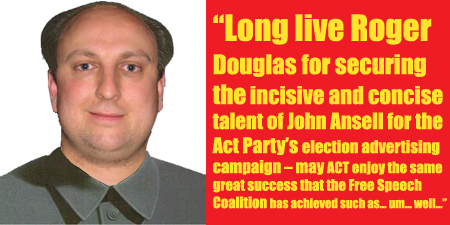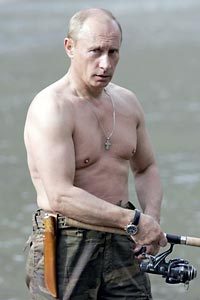I wrote most of this before DPF’s post on the threshold, including his link to Chris Bishop’s handy paper on representation and stability went up, so read that first. In fact, you’d also do very well to look over BK Drinkwater’s series comparing electoral systems: noise, wastage, proportionality, and a critique of some critiques of SM, although note that the SM numbers assume a 70-50 electorate-list split as per our MMP system at present. This is good from an apples-apples perspective, even if it’s not an option that’s actually on the table. I also wrote it before my more-recent post on the topic, for which some people have begun offering their preferred electoral modifications. Wonderful!
Much like the subtext to the s59 referendum question was ‘do you like the anti-smacking bill?’, the question above lurks behind the forthcoming debate on MMP, for which the troops are currently massing.
The likeliest contender, in my view, is the retention of MMP as we have it now, with a 5% threshold and a 70-50 split. Other less-likely contenders, again in my view, are as follows:
- STV, as employed in some local body elections and for the Australian Senate.
- SM, as apparently favoured by National and employed in the Republic of Korea.
Note that FPP isn’t in this list. I don’t think NZ would go back. Modified MMP also isn’t in the list; not that I think it isn’t a credible contender, just that the way the process is structured (referendum: MMP yes/no; if no, referendum on alternate systems) doesn’t seem likely to permit it. There are lots of other peripheral options, such as open list; run-off or instant run-off; or any number of other possibilities. Feel free to argue your corner.
But what sort of system do people actually want? As I see it, within a centralised democratic structure such as we have, relevant factors include the following:
- Transparency. Results in transparent electoral systems are clear and obvious; how a particular candidate, party or government was elected is reasonably self-evident. FPP is very transparent. STV is very opaque.
- Simplicity. Simple systems are easy for people whose political engagement stretches to ticking a box or two every three years to understand. Again; FPP is very simple, STV is not at all.
- Proportionality. Proportional systems elect candidates from parties according to the party’s share of the vote. FPP is not proportional at all. STV is often claimed to be proportional, but it’s really fauxportional, often producing results which seem proportional but were arrived at by non-proportional means. Open list is (in principle) perfectly proportional. Thresholds in proportional systems and the number of electorates in mixed systems are also relevant to this question.
- Representativeness. Similar but orthogonal to proportionality, a representative system contains mechanisms to guarantee certain segments of the electorate representation. This is a complex notion; geographical electorates are such a representative measure, ensuring that people from the geographical margins are represented, when a non-geographically-determined system (such as purely proportional open list) might marginalise them. Reserve seats for tangata whenua or other groups are another such form of representativeness.
- Low wastage/regret. Conventional wisdom is that the prospect of a wasted vote depresses turnout (or changes behaviour) among voters who believe their vote might be wasted, which is a self-perpetuating cycle. This is most evident in FPP, but is also present in proportional systems to an extent, due to the effects of a threshold.
- Decisiveness. Decisive systems produce strong, stable executive governments with few constraints on their power. FPP, except in the rare case of a hung parliament being elected, is decisive, while proportional systems which elect a number of parties and rely on coalitions are less decisive.
- Small size. Self-explanatory. Any system can be made large or small, but this frequently has huge impacts on other factors.
- Durability. Durable systems are not prone to future governments tinkering with, amending or replacing them. FPP was extremely durable. MMP has proven fairly durable. This is a meta-factor, in a sense; it seems like anyone valuing this factor highly should lobby for one of the less-extreme systems; a second-best choice, rather than a perfectly proportional system or a highly decisive system, since ‘pretty good’ is less likely to be overturned.
In principle, the relative importance a person assigns to of each of these factors should point to that person’s ideal electoral system. Could be programmed into a handy poll in the leadup to the referendum; in fact, I bet it already has been, I just haven’t found it.
There are other relevant electoral changes, as well. Here are a few; please add your own:
- Size of parliament and division of seats. Yeah, I listed it above – what I’m referring to here is the electorate-list split in mixed systems; the North/South island and rural/urban splits, that sort of thing. Also the vexed question: how many MPs overall?
- Allocation of seats. Historically, the One True Way in NZ was for seats to be allocated along population-geographic lines. Nowadays it’s a mix of population-geographic and party allegiance. But what other means of allocating seats are there? What would happen if seats were allocated according to social class? Income? Level of education? Ethnicity? Religion? The history of democracy contains precedent for all these things in one way or another.
- Decentralisation. Federation of micro-states? Balance of central and local government power? How does one dismantle centralised democracy using democratic mechanisms?
- Electoral term and other constitutional institutions. Our three-year term is quite short, and there are few checks on the executive ability of governments – as long as they have a parliamentary majority, there’s little they can’t (and won’t) do. Do we need a second chamber? A longer term? Should one go along with the other?
- Referenda and non-electoral plebiscites. What should their status be? Other representative mechanisms, such as citizens’ juries?
- The big one. What difference would becoming a republic make anyhow? A better question: if people knew that NZ would become a republic in the near future, how might their electoral preferences change?
Please, answer the question. What do you actually want in an electoral system, and why? And more than that — what do you want, and what do you think is (even remotely) plausible?
L
Update: Scott Yorke has a few choice words on the topic, as well.


 Via Scott Yorke’s excellent
Via Scott Yorke’s excellent